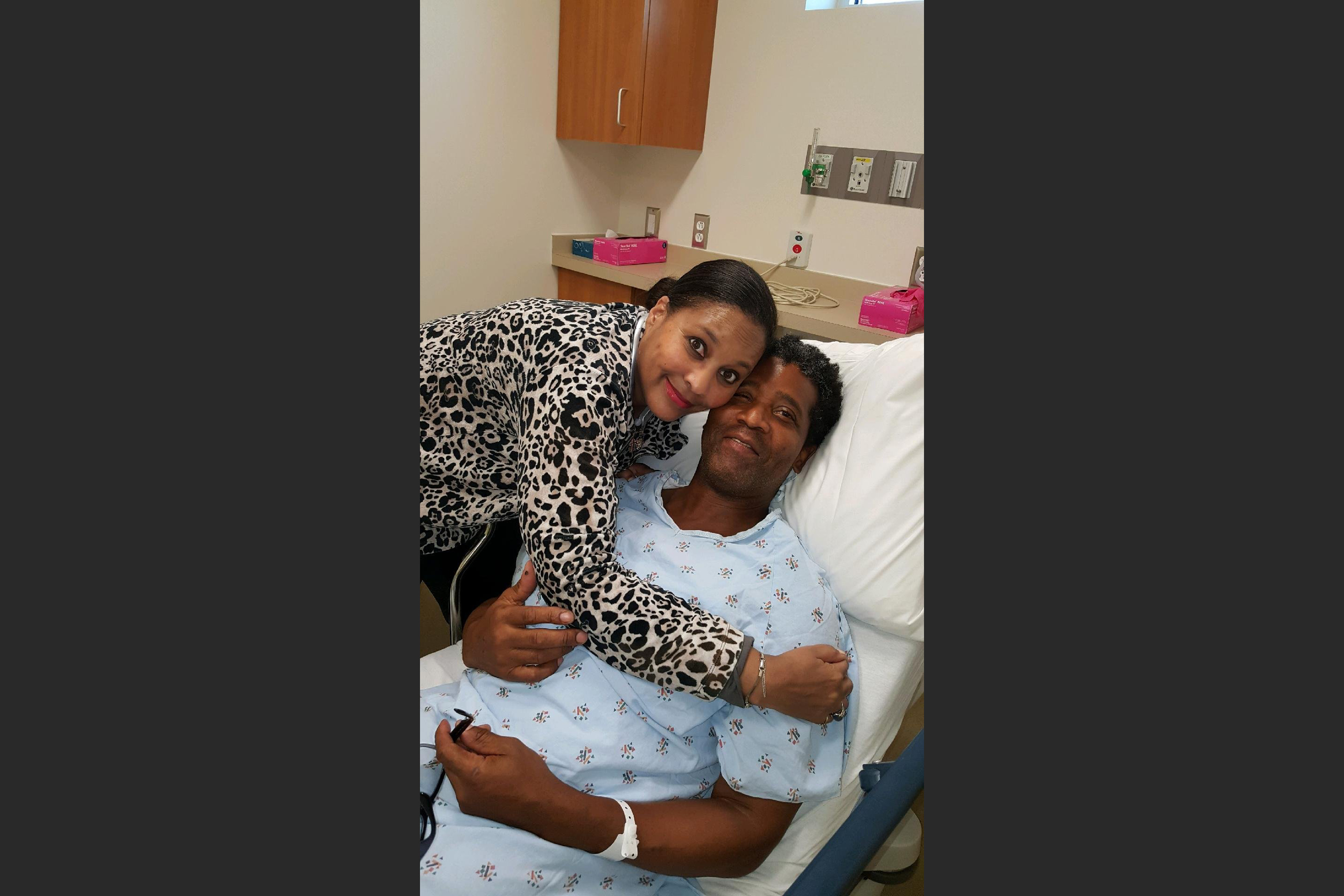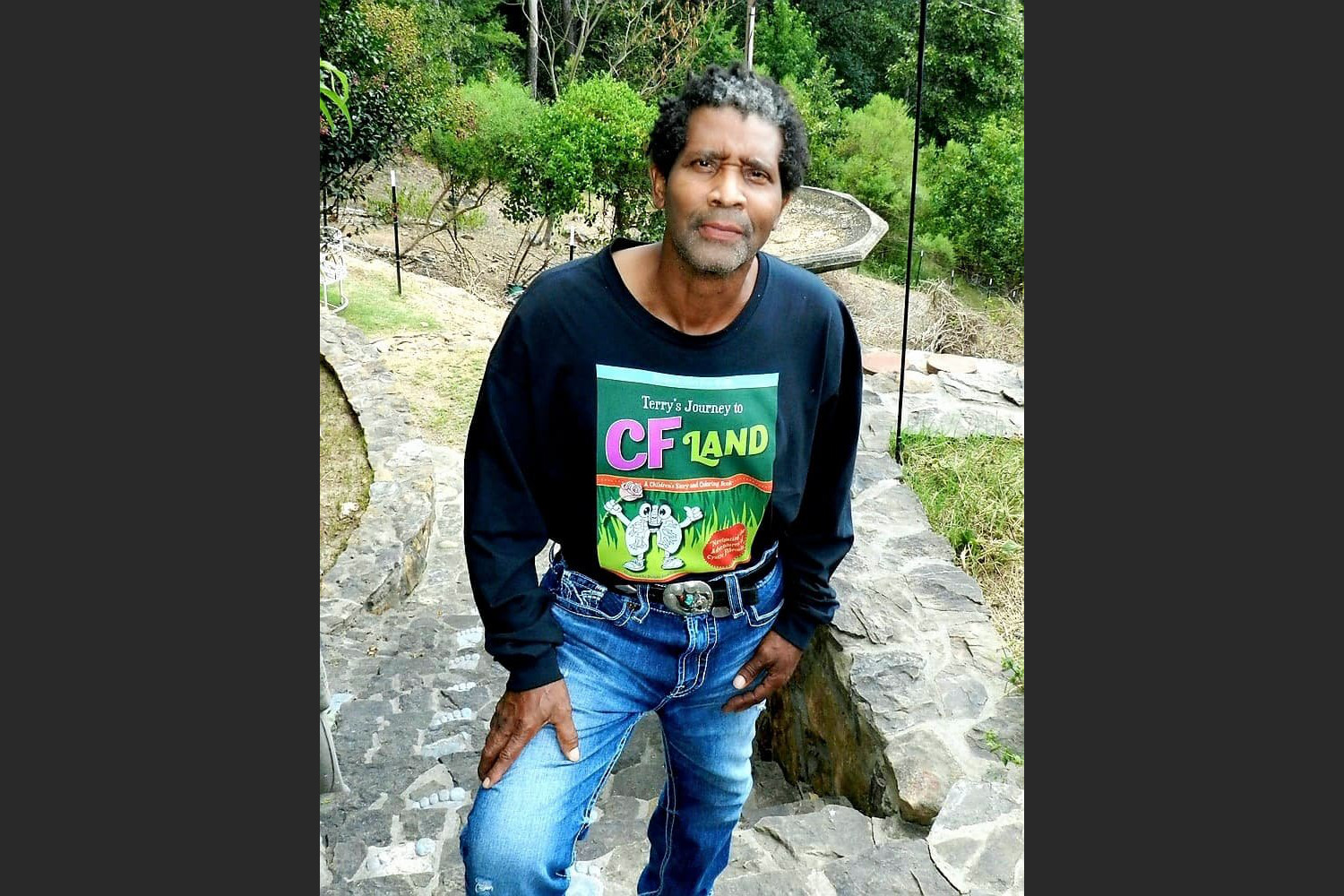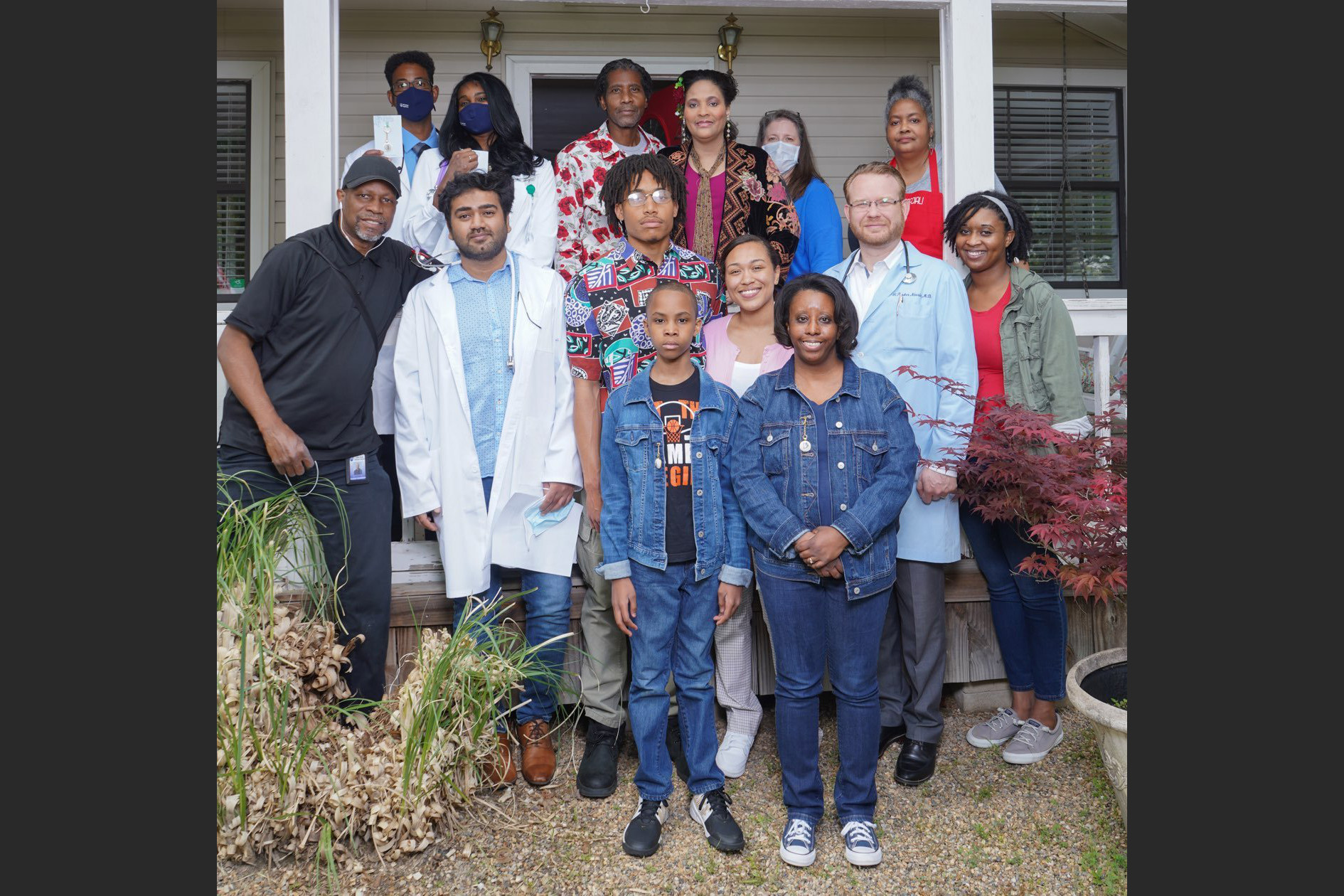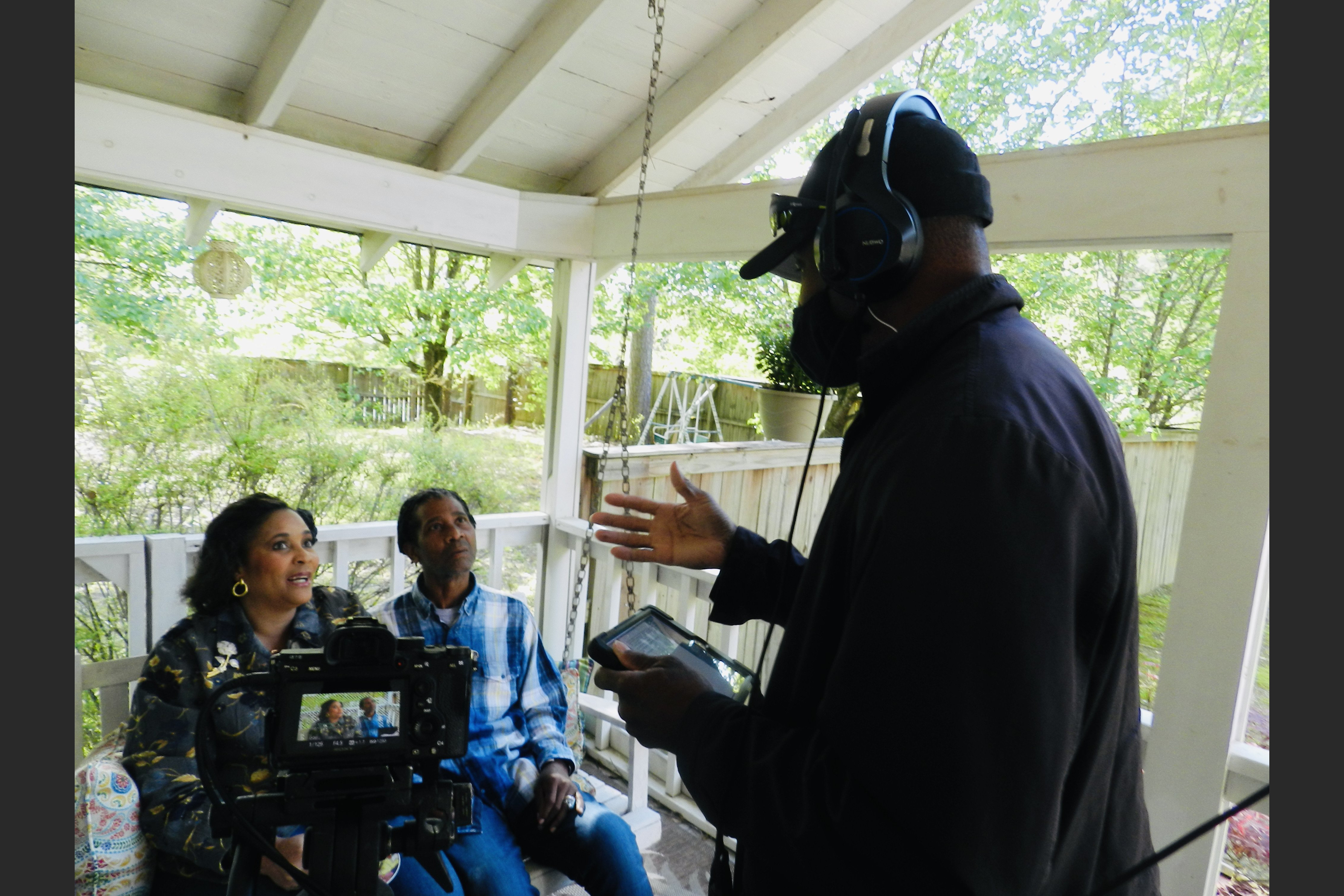Terry and Michele Wright are the picture of marital bliss. In conversation, the two giggle like newlyweds over the adventures of the past 20-plus years. Sparks flash in their eyes as they look at each other and, as they talk about the future, hope rounds out their tone.
"I call it divine connection," Michele says. "I truly believe the day I met Terry I met my God-ordained soulmate. People say, 'I don't believe in fairy tales,' but I just truly believe he was my assignment and I was his."
The heavenly life the couple leads today stands in stark contrast to the hellish realities that have dominated most of their relationship. For all those years, Terry's world was rooted in intense physical pain and an endless spool of health complications; Michele's in lying awake to listen to his ragged breathing, wondering if he'd open his eyes come dawn and if he did, whether he would have the will to fight another day.
Mostly she wondered, as he had since childhood, what's really going on? What are we missing?
"To see him suffer the way I did ... " Michele says, words trailing off into memory. "When I came into his life, Terry was on his last leg. I knew something was wrong from the start. He would always have to go to the restroom and I remember him bringing up his food every time he would eat or drink anything. He was having two, three visits to the emergency room every week. I couldn't understand; how bad of a stomach issue can you have? It was heartbreaking."
Neither of them could have known then, nor scarcely imagine, the truth. Terry was suffering from cystic fibrosis, a condition that affects the pulmonary and digestive systems and, left untreated, myriad other body functions. Commonly diagnosed in early childhood, CF is much rarer in Black and Asian patients than in white patients ... and therein lies the unthinkable element of the story. That for 54 years, Terry had been the victim of a medical community either unable or unwilling to break script, forget probability data and consider the unlikely. That more than five decades of doctor appointments, medications, surgeries had all been wrong. And that without their own sheer doggedness and refusal to yield, Terry's writhing would only be stilled by the grave.
"I'm basically still dealing with the feelings," Terry says today, five years after finally being correctly diagnosed. "I was just happy to know, and relieved to know now, what's going on with me. It's not in my head, which is what I've been told practically all my life."
The couple have run with Terry's story in a big way. They produced "54 Years Late: The Terry Wright Story," a 2021 docudrama short about Terry's life and the couple's struggle for answers. The film can be rented for $10 for a 24-hour streaming period at vimeo.com/ondemand/54yearslate. Written and directed by Michele, the 31-minute film has already received more than 40 accolades from various film festivals and competitions. In June, it captured the Best Documentary Award and the People's CF Choice Award at the first CF Awareness Film Festival.
Filming of "54 Years Late" took place at HD Nursing in Benton, where Dr. Amy Hester, owner and operator, also served as production and set designer. Roger Robinson is the film's director of videography. The film was edited by David C. Weekley — video producer and retired senior instructor for the University of Arkansas at Little Rock's School of Mass Communication.
Shawna Linzy, Arkansas native and Dallas resident, served as a producer and music supervisor. Linzy also wrote and performed the theme song, "Everything"; she and her husband, Timothy Linzy, appear as physicians in the film. Also starring are Davaga Ivory, Judah Ivory, Wesley Peters, Monica Wise, Teara Walls, Abdullah Syed and Ryan Norris, as well as the Wrights themselves.
And every scene features one or more roses ... a symbol of love and also the symbol for the Cystic Fibrosis Foundation.
 Michele Wright visits her husband, Terry Wright — the subject of the short film “54 Years Late: The Terry Wright Story” — in the hospital. Terry Wright is among the rare cases of Black people with cystic fibrosis, a condition that affects the pulmonary and digestive systems and, left untreated, myriad other body functions. Due to that rarity, Terry’s diagnosis didn’t come until middle age. (Courtesy of Michele Wright)
Michele Wright visits her husband, Terry Wright — the subject of the short film “54 Years Late: The Terry Wright Story” — in the hospital. Terry Wright is among the rare cases of Black people with cystic fibrosis, a condition that affects the pulmonary and digestive systems and, left untreated, myriad other body functions. Due to that rarity, Terry’s diagnosis didn’t come until middle age. (Courtesy of Michele Wright)
LIVING WITH A DEMON
From his earliest memory, Terry Wright lived with a demon. Growing up in Little Rock, sickness and vicious pain were nearly constant. His mother, Rose, did all she could to comfort the youngest of her 10 children.
"I just think of many days, many weeks, many months, just constantly being in pain in my abdomen," Terry says. "It was just so severe, just so, so severe. I said once it felt like a donkey had kicked me in the middle of my stomach. I used to complain to my mom about it and you know what moms do. She wants to help and do as much as she can do, so she'd hug me, console me as a child. In bed at night, I would wake up — 'Mom, I'm hurting so bad.' I would sleep with her and I'd just twist and turn all night."
Terry's health problems followed him to school, affecting his ability to learn under the unrelenting hammerblows to the gut. He was kept home a lot and when he did go, much of the time his head was on his desk. On his worst days, Rose would take her baby to Arkansas Children's Hospital, where they'd hear a slightly different verse of the same tune.
"She would listen to the different diagnoses and they would just shoot me up with Demerol and Phenergan," Terry remembers. "Back then, that's strong medicine, especially for a child at a very young age. I remember so vividly them shooting me in different spots all around my hip and my buttocks. [They] would swell up like an egg and they would just kind of massage that poison into my system. There would be big bruises. And that would just get me over the night and the next day it was back again — the pain. I just suffered."
Terry recounts these days calmly, his voice smooth and even like honey on a tabletop. But back then it was a different story, as his inexorable physical suffering began to affect his mind. He'd isolate himself in his room, knotted in pain, dark thoughts seeping into his head.
"Imagine this, a child saying, 'I wish I was just dead,'" he says. "As a child, I'd just go in the room and shut the door and be contained in there like a wild animal. Turning back and forth, I entertained those thoughts, 'I just need to die.' Because I knew if I woke up, nothing was going to change. I'm still going to be feeling the same deal. I spent my life like that."
 Terry Wright is the subject of the award-winning film short “54 Years Late: The Terry Wright Story.” Wright’s cystic fibrosis diagnosis came after more than five decades of doctor appointments, medications and surgeries. Wright’s story is also showcased in a children’s story and coloring book, “Terry’s Journey to CF Land: Navigating the Adventures of Cystic Fibrosis.” (Courtesy of Michele Wright)
Terry Wright is the subject of the award-winning film short “54 Years Late: The Terry Wright Story.” Wright’s cystic fibrosis diagnosis came after more than five decades of doctor appointments, medications and surgeries. Wright’s story is also showcased in a children’s story and coloring book, “Terry’s Journey to CF Land: Navigating the Adventures of Cystic Fibrosis.” (Courtesy of Michele Wright)
LEARNING TO COPE
Somehow, Terry eventually figured out mechanisms for coping with his mysterious condition. He became an expert in what foods would aggravate his stomach least — later to include concoctions containing herbs he grew himself — and in recognizing those days where he just needed to stay empty altogether. Even more amazing is, by the time he'd graduated Little Rock's Hall High School in 1982, he'd devoted himself to fitness and skipped college to become a certified personal trainer.
Going strictly on photos from that era, one would never know what was going on internally. Terry ran marathons, rode 100-mile bike routes and carried a physique that to all the world looked like Division I athlete material. When he and Michele met for a blind first date in 1999, the attraction was immediate.
"I just thought, 'He was one fine specimen. Mmm hmm,'" Michele purrs. "It was the physical attraction, but I was also drawn to his spirit. I never met anyone so real and so kind. Even though he fell in love with me right away, I did not rush it. It took until date three for me."
Terry didn't elaborate much on his medical history; after all, there wasn't that much to tell.
"I explained my childhood, and the bad stomach aches I always had, and the surgeries," he said. "I think she just caught on through observation more than anything. You know, 'This guy's got some issues.'"
A year almost to the day after they met, the two married and settled into domestic life, where Michele gained a full appreciation for what Terry went through on a daily basis and went with him to all his doctor's appointments. With each consultation, each diagnosis and each medicine or operation that didn't help, the spitfire Terry — nicknamed Butterbean — became more convinced that something didn't add up.
 The cast and crew of “54 Years Late: The Terry Wright Story,” the story of Terry Wright (back row, center) and a cystic fibrosis diagnoses that came in middle age after years of medical challenges. (Courtesy of Michele Wright)
The cast and crew of “54 Years Late: The Terry Wright Story,” the story of Terry Wright (back row, center) and a cystic fibrosis diagnoses that came in middle age after years of medical challenges. (Courtesy of Michele Wright)
A CLUE ARISES
A breaking point came when a physician opened his diagnosis with, "If you were not Black, I'd say it's cystic fibrosis," just to immediately dismiss the possibility. On the surface, the statement was medically defensible — the majority of new CF cases are diagnosed by the age of 2 and incidence of the disease is low among Blacks at 1 case for every 17,000 births. Plus, in his 50s, Terry had already surpassed the average life expectancy of a CF patient by more than a decade.
But looking back, the couple believes the medical community should not have been so quick to dismiss the possibility, however improbable, that CF (or anything else for that matter) was the cause of Terry's suffering. Especially given that more logical medical diagnoses had all proven incorrect.
"Race was a factor in this, 100%," Michele says, the fervor rising in her voice. "Keep in mind, he was seeing some of the best of the best doctors and specialists. How could they miss it? They all assumed, because he's Black, he couldn't have cystic fibrosis. They just said it's a bad stomach.
"All those doctors, over 54 years, not one of them said, 'You know what? These are classic signs. Let's test you and let's at least rule it out.' He could have literally died, and we never would have known it was cystic fibrosis."
No one knows how close Terry came to that coming true, but anyone who saw him in 2016 likely thought they were witnessing the beginning of the end — Michele especially.
"I never told Terry this, but right around 2016, when he was hospitalized back-to-back, his lungs got so bad that I would stay up at night because I didn't think he was going to make it through the night," she says. "When he would snore, it would sound like mirrors cracking. I got to the point I just said he's not going to make it if we don't do something. You know the definition of insanity? You keep doing the same thing."
While Terry languished in the hospital through the last two months of 2016, Michele went on a mission. Hypothesizing the cause might be an infection, she started calling every infectious disease physician she could find.
"There were only a handful in the state," she says. "I didn't expect it to be but one or two in Little Rock and when I called [the University of Arkansas for Medical Sciences], they said 'Not only do we have an infectious disease doctor, we have a clinic.' That was the phone call that changed everything."
It was there that Terry's 54-year journey finally reached its summit. UAMS physicians at last dared to consider the possibility, however unlikely, that Terry was a CF anomaly, which he was.
Now, after finally receiving the treatment he needed — including nebulizers for his breathing and enzymatic medications that aid in digestion — he's feeling better than he ever has. But it wasn't enough.
"My journey, my story, that's my testimony. To tell my story is not for Terry; I know I can help others," he said. "So much is still needed, so I share the things that came up on me in my life, to help someone else. That's what we're doing now."
 Michele and Terry Wright are instructed by videography director Roger Robinson in “54 Years Late: The Terry Wright Story.”
Michele and Terry Wright are instructed by videography director Roger Robinson in “54 Years Late: The Terry Wright Story.”
BETTER LATE THAN NEVER
The couple have co-founded the National Organization of African Americans with Cystic Fibrosis (NOAACF), through which they have developed diagnostic tools for minority communities, organized conferences centered on health equity, and spoken and written about the stereotype that CF only affects white patients.
And, the couple's story was featured in two 2021 issues, online and print, of the Journal of American Medicine (JAMA). The article, "Tackling the Misconception That Cystic Fibrosis Is a 'White People's Disease,' " is by JAMA Senior Editor Rita Rubin, MA. The Wrights are also featured for the month of November in the Bonnell Foundation's 2022-23 "Portraits of Cystic Fibrosis" calendar, on sale for $25 at thebonnellfoundation.org. The Royal Oak, Mich.-based foundation's purpose is to help families deal with the challenges of living with CF.
In addition, Terry Wright's story is showcased in a children's story and coloring book, "Terry's Journey to CF Land: Navigating the Adventures of Cystic Fibrosis" (Clovercroft Publishing), currently $12.21 at Amazon.com.
There's plenty more where that came from, Michele says, as the duo looks to spare other families the pain of inaccurate diagnosis and delayed treatment. Some of their goals sound outlandish — Michele insists "54 Years Late" is destined to be a big-budget picture, and the Wrights are currently working toward turning it into a full-length feature film — but after all they've been through, one doubts the miraculous at one's own risk.
"I truly believe that Terry came into my life when he did to help me deal with a stressful situation or I might not be here," she says. "I was diagnosed with Lupus Feb. 14, 1994, and I almost didn't make it. So, we bring out the best of each other.
"Then, I was able to advocate for him when he was to a point where he was tired of fighting. It makes a difference when you have that person advocating for you. That's what I want us to do as an organization — advocate for others who may not have that voice."
